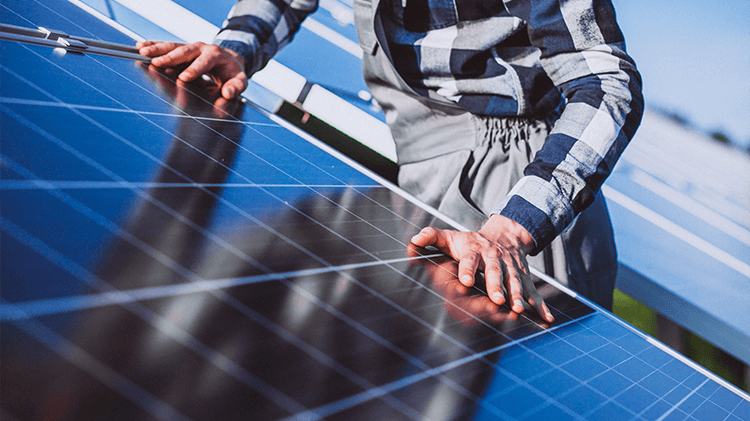#statusMessage#
Do you want to start the compare now?

The discussion about the "future of sustainable energy" and the question of how the energy supply can be secured in the long term is on everyone's lips. The objective is to design energy sources and systems to meet the needs of the present generation without compromising the opportunities of future generations. We spoke to our expert Joerg Scholl, Director of Sales “Electrotechnology” and Technical Sales Engineering, about this topic.
What role do measurement technologies such as smart metering, load measurement and power measurement play in the optimisation of energy systems, especially in the context of the energy revolution and e-mobility?
These measurement technologies play a crucial role in increasing the efficiency of energy systems. Smart metering enables us to record energy consumption precisely and provides us with the potential to reduce electricity consumption significantly by as much as 10 percent. Through targeted load and power measurements we can identify bottlenecks and inefficient energy distribution and thus improve energy efficiency by an average of 15 to 20 percent.
How can the sustainability of the energy supply be improved and its reliability be ensured?
A reliable and sustainable energy supply requires both improved quality assurance and fault detection as well as the increased use of renewable energies. By integrating renewable energies into the power grid, we can increase the security of supply by up to 30 percent. At the same time, we are integrating advanced monitoring systems that detect malfunctions in real time and enable targeted measures to be taken. By doing so, we are not only improving the quality of the energy supply, we are also actively contributing to the growth of renewable energies.
What developments and trends do you see with regard to smart grids and the integration of renewable energies to meet the challenges of the energy revolution?
The developments in the field of smart grids are very exciting. According to official forecasts, more than 80 percent of electricity will come from renewable energy sources by 2030. To support this development, we are integrating advanced communication and automation technologies. By using these technologies, we can increase energy efficiency and increase the share of renewable energies in the power grid. This is estimated to reduce greenhouse gas emissions by up to 50 million tonnes per year. The Smart Grid is definitely the grid of the future!
What specific fields of application are boosted by advanced measurement technologies in relation to energy suppliers and power grids, renewable energy systems and e-mobility?
The technologies mentioned earlier open up a wide range of possible applications. Energy supply companies can benefit from the precise recording of energy consumption and the analysis of load profiles. This enables them to plan their grids efficiently, avoid bottlenecks and help them to increase energy efficiency.
In energy systems, technologies play an important role in monitoring and optimising energy production. This leads to increased efficiency and the more widespread use of renewable energies. Industrial companies can gather valuable insights by using mobile energy and network analysers in their own grids. The data collected provides accurate information on power consumption and symmetrical load distribution directly on site, ensuring that ineffective and expensive load peaks can be avoided, for example. The values can be read directly from a display and, as an option, logged over a specific timespan, such as one complete production cycle. Optimising processes can save energy, which ultimately reduces costs. This in turn makes an active contribution to securing the future of an area by preserving jobs, conserving resources, and protecting the environment.
In e-mobility, these measurement technologies are important, for example, for monitoring the charging process, recording energy consumption, and optimising the charging infrastructure. This enables the efficient integration of e-vehicles into the power grid.
How can we use advancing digitalisation and the integration of artificial intelligence (AI) in electronic measurement technology to develop future-oriented solutions for the energy revolution?
Digitalisation and AI offer us significant opportunities for realising future-oriented solutions. By using AI, we can analyse large amounts of data and identify patterns to further optimise energy consumption. By combining the IoT (Internet of Things) and AI, we can develop smart energy management systems that automatically regulate and optimise energy consumption based on real-time data. These solutions can lead to a further increase in efficiency of up to 30 percent and make a significant contribution to the energy revolution.
This interview illustrates the importance of test and measurement technology for the energy revolution and for energy efficiency. Power measurements can improve the efficiency of energy systems and enable the ideal integration of renewable energies. The use of artificial intelligence and advancing digitalisation open up new opportunities to develop future-oriented solutions. Through the targeted use of these technologies, we can create a sustainable and reliable energy supply for the future.
Director of Sales “Electrotechnology” and Technical Sales Engineering
Sie sind sich noch nicht ganz sicher oder haben weitere Fragen zu den Geräten? Zögern Sie nicht uns zu kontaktieren. Ob direkt am Telefon oder per Online-Demo bequem bei Ihnen vor dem Bildschirm – Unsere Experten sind für Sie da.